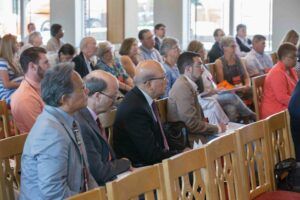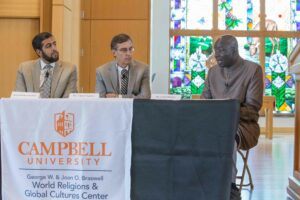Thursday marked the first day of Campbell Divinity School’s inaugural conference, sponsored by the George W. and Joan O. Braswell World Religions and Global Cultures Center. The two-day event was designed to provide a constructive platform for dialogue between different faith cultures, and this year’s theme — “Jesus in a Pluralistic Age” — did not shy away from tough questions.

As more than fifty guests settled into Butler Chapel for the conference, cultures center director Caleb O. Oladipo prepared the audience to be challenged.
“Living in a pluralistic age presents people of faith with challenges unlike any other. We are not here to make you comfortable, but we are also not here to make you uncomfortable,” said Oladipo. “We are here with the hope that our discussions would bring us closer to one another.”
Oladipo’s opening address defined religious pluralism as “an attempt to come to terms with other religions and diversity of religious interpretation,” discussing the benefits of learning from other cultures’ faith traditions and introducing several ways that Jews, Christians and Muslims can improve the quality of relationships among devoted followers of their faiths.

“You cannot preach Jesus with hate in your heart for others,” said Oladipo. “It is my sincere desire that you will enter wholeheartedly into dialogues in a spirit of reverence and openness to the fulfillment of God’s promise.”
The conference continued with a clergy panel discussion on the topic “Who is Jesus in our Faith Traditions.” Imam Mohamed AbuTaleb, Rabbi Eve Eichenholtz and Pastor Chris Chapman shared how their three faiths can find common ground through service projects, the necessity of agreeing to disagree and the importance of fighting against fear and uncertainty when talking about beliefs with others.
Friday’s presenters included Leo Lefebyre, Peter Pham, Ya-Tung Chuang, Steven Porter, George Braswell. Their lectures on Jesus’ role in various religious cultures aimed to teach audiences how to engage in dialogue about who Jesus is to people of other faiths. The Divinity School’s director of church relations and development, Peter Donlon, was pleased with the open dialogue he heard throughout the day.
“If we desire to deeply understand religions, we cannot conduct our study exclusively on our own or always privately,” said Oladipo. “Intentional, meaningful conversation allows us to create space for community.”

